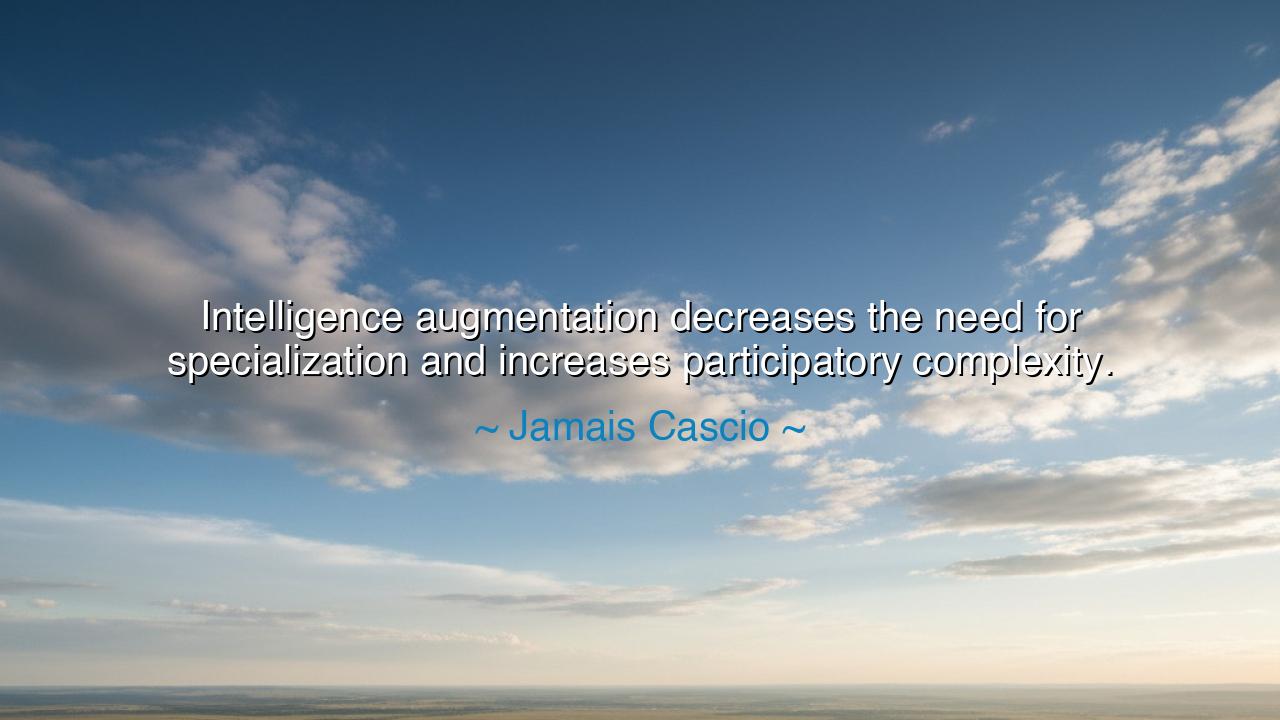
Intelligence augmentation decreases the need for specialization
Intelligence augmentation decreases the need for specialization and increases participatory complexity.






In the words of the futurist Jamais Cascio, there lies a revelation for the ages: “Intelligence augmentation decreases the need for specialization and increases participatory complexity.” To the hurried ear, it may sound as though he speaks of machines and data — the cold whisper of the modern age. Yet beneath the surface, his words carry a wisdom as old as civilization itself. They tell of a new dawn, when the mind of humanity extends beyond its own flesh, and the boundaries between the learned and the unlearned begin to dissolve. It is the song of a world where intelligence is no longer a solitary flame, but a fire shared among all.
To augment intelligence is to lift the human mind upon wings of creation — to weave its thought with tools, to stretch its reach across the vast fields of knowledge. In the ancient days, wisdom was the privilege of a few: the scholar, the priest, the scribe. The artisan mastered his craft, the healer his herbs, the navigator his stars. Each lived within the narrow garden of his own skill. But now, with the rise of machines that think, of systems that learn and whisper answers faster than the tongue can form the question, we are no longer confined to our small domains. The need for specialization wanes, for the tools of intelligence now serve as companions to every seeker.
Yet Cascio’s insight does not praise ease; it praises interconnection. When the burden of mastery is shared with the tools of thought, the burden of creation expands to all. What emerges is not simplicity, but participatory complexity — a dance of many minds, human and artificial, weaving patterns no single specialist could conceive alone. It is as if humanity itself becomes an orchestra, where each instrument, guided by collective intelligence, plays in harmony toward a greater design. This is not the end of mastery, but its transformation — from isolation to communion.
We have seen glimpses of this transformation before. When the printing press was born, it multiplied human knowledge beyond the reach of any scholar’s memory. When the internet came, it interlinked minds across oceans and generations. Each leap of communication diminished the supremacy of the few and empowered the many. In the Renaissance, Leonardo da Vinci was called the “universal man” because he crossed the borders of art, anatomy, and engineering — a mind augmented not by machines, but by insatiable curiosity. Now, through intelligence augmentation, we approach an age when the spirit of da Vinci may dwell in every one of us — when each mind, guided by shared intelligence, may touch the infinite.
But beware: with this gift comes the challenge of complexity. To live in a world where knowledge is everywhere is to live in a storm of meaning. No longer can one person claim to understand it all. Instead, wisdom must become collaborative — built from the voices of many, bound by shared intent. To thrive in such an age, one must learn not only to think, but to connect, to listen, to weave one’s fragment of truth into the tapestry of the whole. This is the new artistry of the augmented age — not mastery of a craft, but mastery of cooperation.
Thus, Cascio’s words ring like a prophecy: the age of isolation is ending, and the age of collective intelligence is upon us. The wise will not cling to their narrow expertise, fearing irrelevance. They will open themselves to dialogue, to learning, to the humility of being one mind among many. For the power of augmentation is not in replacing thought, but in uniting it — transforming the solitary seeker into a participant in the grand design of civilization.
So, to those who would walk this path, take heed of this teaching: Do not fear the expansion of intelligence — fear only stagnation. Learn broadly. Collaborate freely. Question deeply. Let your tools amplify not only your knowledge, but your compassion and imagination. Build not walls of specialization, but bridges of understanding. For in the age of augmented intelligence, the greatest mind is not the one that knows most, but the one that connects best — the one that helps all others rise together toward the horizon of shared enlightenment.






AAdministratorAdministrator
Welcome, honored guests. Please leave a comment, we will respond soon